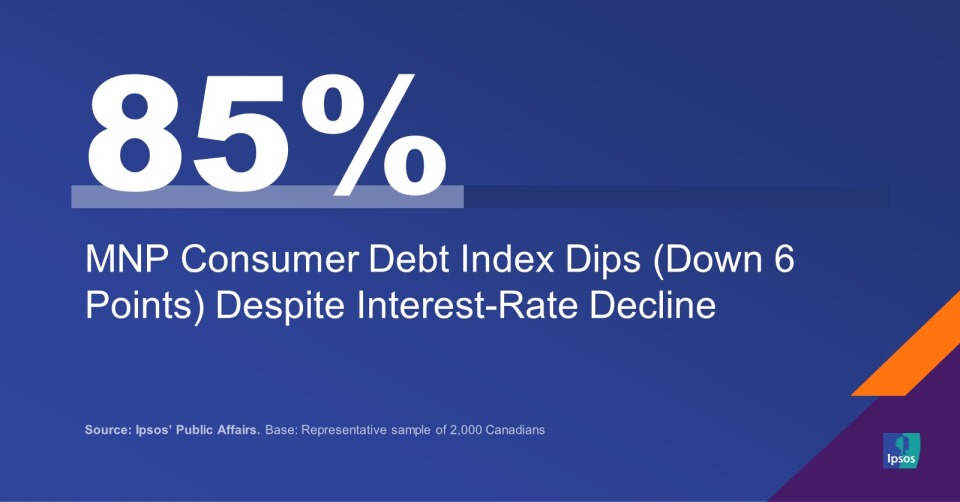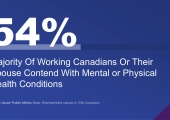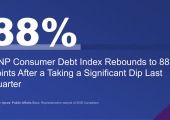MNP Consumer Debt Index Dips (Down 6 Points) Despite Interest-Rate Decline
Over half (57%) say interest rates will need to go down a lot before their financial situation significantly improves.

Toronto, ON, July 22, 2024 — The MNP Consumer Debt Index has dropped to 85 points, a 6-point decrease from the previous quarter, demonstrating a worsening mood among Canadians towards their debt situation. Despite a brief upswing of optimism last quarter, Canadians are expressing renewed pessimism about their personal finances. The Bank of Canada's recent announcement about lowering key interest rates might have prompted some to expect a more substantial or immediate effect. As a result, they're now more disheartened, eagerly looking forward to the next announcement in the hope of a steady decline that will significantly influence their financial situation.
Most Canadians Increased Their Spending Leaving Less at Month-End
Consistent with last quarter, 46% of Canadians are $200 or less away from failing to meet all their financial obligations. However, there is a shift among those who were close to insolvency and already not making enough to cover their bills. 29% of Canadians say they already can't cover their bills and debt payments, a decrease of 2 points, and those who are $1 to $200 away from insolvency has increased by 3 points. Women (50%, +3) persist in being more vulnerable to insolvency compared to men (41%, -1). It's particularly noteworthy that the proportion of Albertans (47%, +13) facing insolvency risk has significantly risen. Among Canadians who feel swamped by debt and doubt the effectiveness of lower interest rates, 62% are either insolvent or on the brink of it.
Canadians are spending more this quarter as the average amount of money that Canadians have left over at the end of the month has dropped to $782, down $60 from the previous quarter. Many Canadians from different backgrounds are seeing less money left at the end of the month, possibly due to spending more as interest rates drop, higher housing costs, or ongoing high inflation. However, Canadians aged 55 and over and those earning less than $40K a year have about $100 more left over this quarter, likely because they're trying to cut back and save.
Negative Sentiment on Current Debt but Optimistic for the Future
Canadians’ net personal debt rating (positive subtract negative) has declined to 19 points, a three-point decrease from last quarter. The shift is a result of fewer Canadians rating their personal debt situation as ‘excellent’ (38%, -3). Compared to last quarter, concerns around personal finances remain consistent with a slight uptick in Canadian households who are concerned that they or someone in their household could lose their job (37%, +2).
Current debt perceptions have declined significantly after a generous bump in March 2024. Canadians were asked to reflect on their current debt situation compared to one year ago, and fewer perceive their current debt situation to be better (23%, -4), while more have rated their current debt situation as much worse compared to a year ago, an increase of 3 points from the previous quarter (19%). However, Canadians’ perceptions of their expected debt situation in the future continue to climb after reaching record lows in September 2023. When Canadians were asked to consider their expected debt situation five years from now, four in 10 expect their debt situation to be better (39%, +2).
Perceptions of Rising Interest Rates Worsens
Canadians’ perception of their ability to absorb additional interest rate increases has declined significantly from last quarter matching levels compared to last year. When asked their ability to absorb an interest rate increase of 1 percentage point, one in five (21%, -4) say they are much better equipped to absorb this increase than they used to be, while a quarter (25%, +5) say their ability to deal with this increase has worsened. When the 1% was phrased as an extra $130 in interest rates increases, fewer (19%, -5) say their ability to absorb this increase is much better, while more (35%, +8) say it is much worse. As signs point to falling interest rates over the next few years, Canadians may react negatively to rates that are slow to decrease or, even worse, start to rise again – inflation is back on the rise!
Canadians are unprepared for any increase in interest rates. The sentiment remains consistent with more Canadians expressing concern that if interest rates rise significantly, they will be in financial trouble (57%, +3). Despite interest rates showing signs of decline, two-thirds of Canadians state they desperately need interest rates to go down (66%) and high interest rates have had a negative impact on their household’s finances (65%). Just under half agree that even if interest rates decline, they are still concerned with their ability to repay their debts (47%). Women and Canadians aged 18-54 are most likely to agree they desperately need interest rates to go down and that high interest rates have had a negative impact on their household’s finances.
Canadians Depending on Further Interest Rate Decline
If interest rates drop in the next three months, many Canadians intend to save more (45%) or accelerate their debt repayment (36%). However, nearly three in ten believe that declining interest rates won't affect them in any way (29%). Canadians aged 18-34 are significantly more inclined to save more or spend more on non-essential items if interest rates decrease, while those aged 34-54 are more likely to focus on paying off debt more quickly.
More than half of Canadians say interest rates will need to go down a lot before their financial situation significantly improves (57%). They also express concern that interest rates may not decline quickly enough to provide the financial relief they require (56%). Notably, 34% feel they are so heavily in debt that even lower interest rates would offer little help. Quebecers and Canadians with $40K or less are significantly most likely to say they have accumulated so much debt that lower interest rates won’t help much.
About the Study
These are some of the findings of an Ipsos poll conducted between June 6 –11 2024, on behalf of MNP LTD. For this survey, a sample of 2,000 Canadians aged 18 years and over was interviewed. Weighting was then employed to balance demographics to ensure that the sample's composition reflects that of the adult population according to Census data and to provide results intended to approximate the sample universe. The precision of Ipsos online polls is measured using a credibility interval. In this case, the poll is accurate to within ±2.5 percentage points, 19 times out of 20, had all Canadian adults been polled. The credibility interval will be wider among subsets of the population. All sample surveys and polls may be subject to other sources of error, including, but not limited to coverage error, and measurement error.
For more information about the MNP Consumer Debt Index, please visit mnpdebt.ca/CDI.
For more information on this news release, please contact:
Sean Simpson
Senior Vice President, Canada, Public Affairs
[email protected]
Raymond Vuong
Account Manager, Canada, Public Affairs
[email protected]
About Ipsos
Ipsos is the world’s third largest market research company, present in 90 markets and employing more than 18,000 people.
Our passionately curious research professionals, analysts and scientists have built unique multi-specialist capabilities that provide true understanding and powerful insights into the actions, opinions and motivations of citizens, consumers, patients, customers or employees. We serve more than 5000 clients across the world with 75 business solutions.
Founded in France in 1975, Ipsos is listed on the Euronext Paris since July 1st, 1999. The company is part of the SBF 120 and the Mid-60 index and is eligible for the Deferred Settlement Service (SRD).
ISIN code FR0000073298, Reuters ISOS.PA, Bloomberg IPS:FP www.ipsos.com
More insights about Financial Services


![[WEBINAR] KEYS: Global Trends - The Uneasy Decade](/sites/default/files/styles/related_more_insights/public/ct/event/2025-09/thumbnail-templates_0.png?itok=Qh37M2xL)
![[WEBINAR] Canadian EV Adoption Trends in 2025](/sites/default/files/styles/related_more_insights/public/ct/event/2025-01/thumb.png?itok=RSGzZvMm)
![[WEBINAR] Sustainable Packaging: A Potential Avenue of Distinction](/sites/default/files/styles/related_more_insights/public/ct/event/2023-09/SustainablePackaging_WebR_feature%20copy.jpg?itok=X0DpNf_C)